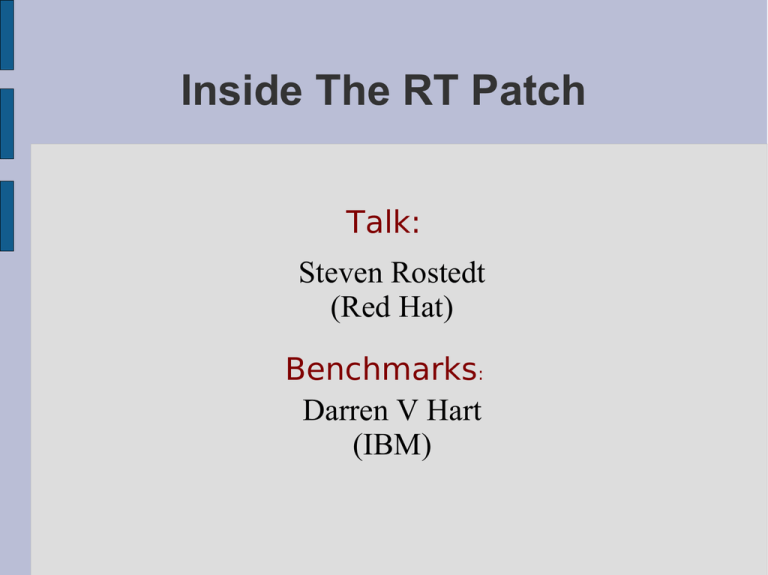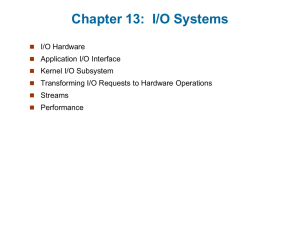Inside The RT Patch
advertisement

Inside The RT Patch Talk: Steven Rostedt (Red Hat) Benchmarks: Darren V Hart (IBM) Inside The RT Patch Talk: Steven Rostedt (Red Hat) Benchmarks: Darren V Hart (IBM) Understanding PREEMPT_RT Talk: Steven Rostedt (Red Hat) Benchmarks: Darren V Hart (IBM) Understanding PREEMPT_RT Talk: Steven Rostedt (Red Hat) Benchmarks: Darren V Hart (Intel) Understanding PREEMPT_RT Talk: Steven Rostedt (Red Hat) Benchmarks: Darren V Hart (Intel) ELC-EU ● http://free-electrons.com/blog/elce-2012-videos/ So what should I talk about? So what should I talk about? Wikimedia Commons Trebuchet Wikimedia Commons Trebuchet Wikimedia Commons Trebuchet Trebuchet Trebuchet Where to get the RT patch ● Stable Repository – ● ● git://git.kernel.org/pub/scm/linux/kernel/git/rt/linux-stable-rt.git Patches – http://www.kernel.org/pub/linux/kernel/projects/rt/ – https://rt.wiki.kernel.org/index.php/Main_Page Wiki What is a Real-time OS? ● ● ● Deterministic – Does what you expect to do – When you expect it will do it Does not mean fast – Would be nice to have throughput – Guarantying determinism adds overhead – Provides fast “worst case” times Can meet your deadlines – If you have done your homework What is a Real-time OS? ● ● Dependent on the system – SMI – Cache – Bus contention hwlat detector – New enhancements coming The Goal of PREEMPT_RT ● ● 100% Preemptible kernel – Not actually possible, but lets try regardless – Remove disabling of interrupts – Removal of disabling other forms of preemption Quick reaction times! – bring latencies down to a minimum Menuconfig No Preemption ● Server – ● Do as most possible with as little scheduling overhead Never schedule unless a function explicitly calls schedule() ● Long latency system calls. ● Back in the days of 2.4 and before. Voluntary Preemption ● might_sleep(); – calls might_resched(); calls _cond_resched() – Used as a debugging aid to catch functions that might schedule called from atomic operations. – need_resched – why not schedule? – schedule only at “preemption points”. Preemptible Kernel ● ● ● ● Robert Love's CONFIG_PREEMPT SMP machines must protect the same critical sections as a preemptible kernel. Preempt anywhere except within spin_locks and some minor other areas (preempt_disable). Every spin_lock acts like a single “global lock” WRT preemption. Preemptible Kernel (Basic RT) ● ● ● Mostly to help out debugging PREEMPT_RT_FULL Enables parts of the PREEMPT_RT options, without sleeping spin_locks Don't worry about it (It will probably go away) Fully Preemptible Kernel The RT Patch ● ● PREEMPT_RT_FULL Preempt everywhere! (except from preempt_disable and interrupts disabled). ● spin_locks are now mutexes. ● Interrupts as threads – ● interrupt handlers can schedule Priority inheritance inside the kernel (not just for user mutexes) Sleeping spin_lock ● ● ● ● ● CONFIG_PREEMPT is a global lock (like the BKL but for the CPU) sleeping spin_locks contains critical sections that are localized to tasks Must have threaded interrupts Must not be in atomic paths (preempt_disable or local_irq_save) Uses priority inheritance – Not just for futexes PREEMPT_LAZY ● ● RT can preempt almost anywhere Spinlocks that are now mutexes can be preempted – ● Do not preempt on migrate_disable() – ● Much more likely to cause contention used by sleepable spinlocks Increases throughput on non-RT tasks Priority Inheritance ● Prevents unbounded priority inversion – ● Can't stop bounded priority inversion Is a bit complex – One owner per lock – Why we hate rwlocks ● will explain more later Unbounded Priority Inversion blocked A B C preempted preempted Priority Inheritance blocked sleeps A wakes up B C preempted releases lock raw_spin_lock ● ● ● ● ● Some spin_locks should never be converted to a mutex Same as current mainline spin_locks Should only be used for scheduler, rtmutex implementation, debugging/tracing infrastructure and for timer interrupts. Timer drivers for clock events (HPET, PM timer, TSC) Exists today in current mainline, with no other purpose as to annotate what locks are special (Thank you Linus!) Threaded Interrupts ● ● ● Lowers Interrupt Latency Prioritize interrupts even when the hardware does not support it. Less noise from things like “updatedb” Interrupt Latency Task interrupt device handler Interrupt Thread Task interrupt wake up device thread device handler sleep Non-Thread IRQs ● Timer interrupt – ● IRQF_TIMER – ● Manages the system (sends signals to others about time management) Denotes that a interrupt handler is a timer IRQF_NO_THREAD – When the interrupt must not be a thread – Don't use unless you know what you are doing – Must not call spin_locks Threaded Interrupts ● ● ● Now in mainline – Per device interrupts – One big switch (all irqs as threads) Per device is still preferred – except for non shared interrupts – Shared devices can have different priorities One big switch – Handlers the same, but just threaded Threaded Interrupts ● request_threaded_irq() – ● Tells system driver wants handler as thread Driver registers two functions – handler ● If NULL must have thread_fn – – ● – Disables irq lin handler assigned by system non-NULL is called by hard irq thread_fn (optional) ● ● When set makes irq threaded non-NULL to disable device only Threaded Interrupts ● The kernel command line parameter – ● threadirqs threadirqs forces all IRQS to have a “special” handler” and uses the handler as thread_fn – except IRQF_NOTHREAD, IRQF_PER_CPU and IRQF_ONESHOT local_irq_disable ● EVIL!!! ● This includes local_irq_save ● No inclination to what it's protecting ● SMP unsafe ● High latency spin_lock_irqsave ● The Angel ● PREEMP_RT does NOT disable interrupts ● ● – Remember, in PREEMPT_RT spin_locks are really mutexes – low latency Tight coupling between critical sections and disabling interrupts Gives a hint to what it's protecting – (spin_lock name) preempt_disable ● local_irq_disable's younger sibling ● Also does not give a hint to what it protects ● preempt_enable_no_resched – only should be used within preempt_disabled locations – __preempt_enable_no_resched ● Only use before directly calling schedule() per_cpu ● ● Avoid using: – local_irq_save – preempt_disable – get_cpu_var (well, you can, but be nice – it calls preempt_disable) Do: – pinned CPU threads – get_cpu_light() – get_local_var(var) – local_lock[_irq[save]](var) get_cpu_light() ● Non PREEMPT_RT is same as get_cpu() ● On PREEMPT_RT disables migration get_local_var(var) ● ● Non PREEMPT_RT is same as get_cpu_var(var) On PREEMPT_RT disables migration local_lock[_irq[save]](var) ● Non PREEMPT_RT is just preempt_disable() ● On PREEMPT_RT grabs a lock based on var – disables migration ● Use local_unlock[_irq[restore]](var) ● Labels what you are protecting rwlocks ● ● Death of Determinism Writes must wait for unknown amount of readers ● Recursive locking ● Possible strange deadlock due to writers – Yes, affects mainline too! NOHZ ● idle nohz best for power management ● Not nice for responses from idle ● Process nohz coming soon (nothing to do with idle nohz, but uses same ideas and in some cases, same code) Real-Time User Space ● Don't use priority 99 ● Don't implement spin locks – Use priority inheritance futexes – PTHREAD_PRIO_INHERIT ● Avoid slow I/O ● mmap passing data ● mlock_all() – at least the stuff you know you need Questions?



